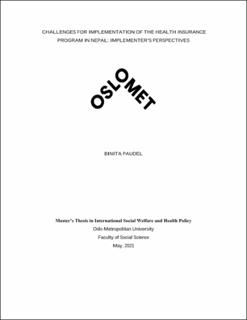Challenges for implementation of the health insurance program in Nepal: Implementer's perspectives
Master thesis
Published version
Permanent lenke
https://hdl.handle.net/11250/2789535Utgivelsesdato
2021Metadata
Vis full innførselSamlinger
Sammendrag
ntroduction: The National Health Insurance Program is one of the most significant policy initiatives by the Nepal government. The program was started in 2016 as a pilot project in three districts with the objectives to reduce financial hardship, increase access and equality to quality health care, and as an approach to achieve Universal Health care (UHC) in Nepal. However, there are challenges and obstacles to implementing the insurance reform successfully, which should be identified to eliminate them hopefully. This study's main objective is to explore the challenges from the perspective of different levels of implementers. Further, it explored the solutions for these challenges.
Method and material: The study is qualitative, and ten key informants were purposively selected for in-depth interviews. They were the National Insurance Board staffs (6), a health service provider (2), and enrolment assistants (2). The qualitative thematic analysis was used to generate different themes, categories, and subcategories.
Results: Multiple interrelated challenges were drawn from the study rather than any particular challenges. Poor educational awareness, promotion, and marketing, reimbursement delay, adverse selection, lack of trust, weak incentives, lack of coordination with the local authority and community mobilization, lack of human resources, poor quality health service, fraud, poor identification problems, lack of political support and overlapping of different government programs were major challenges. Participants also reported some solution methods to deal with these problems. They included increased educational awareness, improved human resource management, adoption of online and digital sign-up methods, more appropriate salary and motivational support, political support, integrating the different program into the insurance scheme, early evaluation of service sites before implementing the scheme, and finally, legal regulation to control fraud and corruption. This study offers a theoretical elaboration of challenges between three actors (the Nepalese people, the health care providers, and the health insurance providers) and problems related to the institutional working environment.
Conclusion: The National Health Insurance Program is one of Nepal's most ambitious programs, ensuring its effective implementation is necessary. Multiple sectors like political parties, government program managers, stakeholders, and local authorities need to work better to make the national health insurance program successful.
